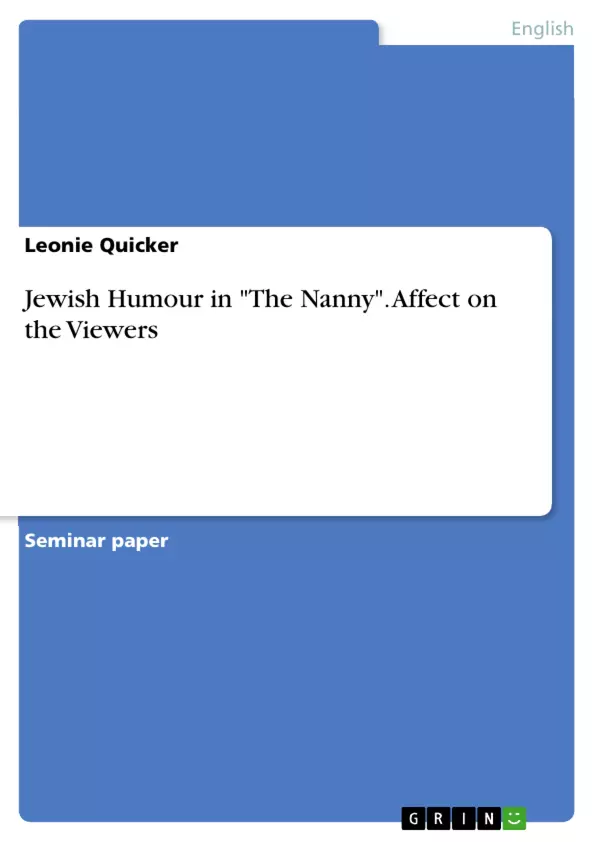This term paper is set out to investigate how Jewish humour is represented in "The Nanny" and what kind of affect it has on the viewers. To shed light on this matter, this research paper will first talk about the way humour is used in Jewish history in order to handle and cope with the past and the way it might vary depending on the medium for which it is used for. These findings and elements will be taken into consideration for the following analysis of the first and last season of The Nanny series, since some audiences have mentioned a negative change in humour and content in comparison to the first released episodes. Afterwards, these comparisons and findings will once again be compared to general reviews of the audience, thereby, this term paper wants to answer the question of the function of humour in The Nanny and whether the viewers accept this way of processing the past or if it failed by ridiculing history.
When I was a child, I watched The Nanny every day after school and enjoyed every minute of it. I laughed; I cried and felt for every character on screen. However, the only thing I never really understood until I was older, was the Jewish humour, or rather the jokes, which they make about the Jewish traditions and religion. I laughed anyway, because the atmosphere and setting in which it was told, was set to make you laugh. However, after learning everything about the history of the Jewish religion, re-watching the show felt slightly different. It was still entertaining and meant to be funny, but there was some seriousness and uncomfortable feeling going along with it and personally raised the question of how The Nanny series had been perceived among the Jewish community.
Inhaltsverzeichnis (Table of Contents)
- Introduction
- Jewish Humour
- The Nanny
- Season One
- Season Six
- Comparison and Discussion
- Reviews of the audience
- Conclusion
Zielsetzung und Themenschwerpunkte (Objectives and Key Themes)
This term paper investigates the representation of Jewish humor in the television series "The Nanny" and its impact on viewers. It explores how Jewish humor is used to cope with the past and the way it can vary depending on the medium. The paper also analyzes the first and last seasons of the series, considering audience feedback regarding changes in humor and content.
- The evolution of Jewish humor in response to historical events and cultural contexts.
- The portrayal of Jewish identity and stereotypes in "The Nanny."
- The function of humor in the series, particularly its comedic and social commentary aspects.
- The reception of "The Nanny" by viewers, specifically within the Jewish community.
- The potential for Jewish humor to be perceived as both entertaining and problematic.
Zusammenfassung der Kapitel (Chapter Summaries)
The introduction discusses the author's personal experience with "The Nanny" and their motivation for studying the series' use of Jewish humor. The first chapter explores the origins and characteristics of Jewish humor, tracing its development in Eastern Europe and its role as a coping mechanism during difficult times. The second chapter delves into the representation of Jewish humor in "The Nanny," specifically examining the first season of the series. This chapter analyzes the series' use of humor in relation to authorities, food, family, and Jewish subjects, providing examples from specific episodes.
Schlüsselwörter (Keywords)
Jewish humor, "The Nanny," television series, stereotypes, identity, cultural representation, audience reception, social commentary.
Frequently Asked Questions
How is Jewish humor used in the TV series "The Nanny"?
The series uses Jewish humor to address traditions, religion, and identity, often employing stereotypes for comedic effect and social commentary.
What is the historical function of Jewish humor?
Historically, Jewish humor has served as a coping mechanism to handle difficult times and process the past, originating largely in Eastern Europe.
Did the humor in "The Nanny" change over time?
Audience reviews suggest a negative change in humor and content in the later seasons (e.g., season six) compared to the earlier episodes.
How was "The Nanny" perceived by the Jewish community?
The reception was mixed; while many found it entertaining, some felt it occasionally crossed the line into ridiculing history or being uncomfortable.
Does the show ridicule Jewish history?
The paper investigates whether the show successfully processes the past through humor or if it fails by making light of serious historical contexts.
What role does food and family play in the series' humor?
Food and family are central themes used to create relatable comedic situations that highlight specific cultural traits and stereotypes.
- Quote paper
- Leonie Quicker (Author), 2019, Jewish Humour in "The Nanny". Affect on the Viewers, Munich, GRIN Verlag, https://www.grin.com/document/1354061



